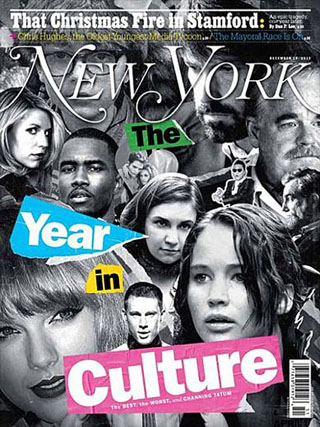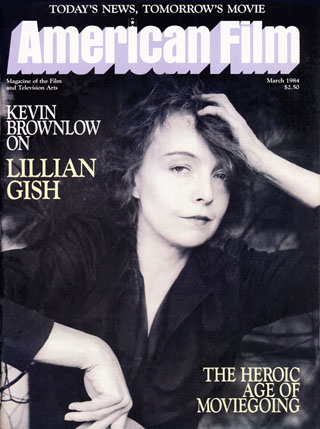David Edelstein opens New York‘s “Year in Culture 2012” cover package with his top ten, and Kathryn Bigelow’s Zero Dark Thirty takes #1 slot: “This is a phenomenal piece of action filmmaking—and an even better piece of nonaction filmmaking. It also borders on the politically and morally reprehensible. By showing these excellent results—and by silencing the cries of the innocents held at Abu Ghraib, Bagram, and other ‘black sites’—it makes a case for the efficacy of torture. How to reconcile these two feelings? The debate begins December 19.” And his “Film Performance of the Year“: “It’s hard to call an Academy Award–winning actress ‘undersung,’ yet I think we take Rachel Weisz for granted. How else to explain the swift disappearance of Terence Davies’s ravishing The Deep Blue Sea with its to-die-for lead performance?”
Also: Matt Zoller Seitz writes up his top ten TV shows (#1: Mad Men), plus Nitsuh Abebe on pop, Justin Davidson on classical music performances, Scott Brown on theater, Kathryn Schulz on books, Jerry Saltz on art (his #1: “Clint and the Chair”), and a critics’ roundtable.
More lists. The New York Times Book Review‘s “10 Best Books of 2012,” Tyler Green‘s choices at Modern Art Notes, and gorilla vs. bear‘s “albums of 2012.”
In other news. Quentin Tarantino’s Django Unchained has been screened to a lucky few and the Guardian‘s Ben Child collects the initial tweeted—and quite enthusiastic—responses.
In Contention‘s Kristopher Tapley reports from the Academy’s Governors Awards, where “Honorary Oscar recipients were documentary filmmaker D.A. Pennebaker, AFI and Kennedy Center Honors founder George Stevens Jr. and stunt coordinator Hal Needham, while Jeffrey Katzenberg received the Jean Hersholt Award for his fundraising and philanthropy.”
The Turin Film Festival wrapped over the weekend and desistfilm‘s got the award-winners.
Reading. American Film is running Kevin Brownlow‘s 1984 profile of Lillian Gish.
The NYT‘s Dave Itzkoff has a breezy chat with Bill Murray that leads both of them onto a stage in front of a few hundred members of the Screen Actors Guild: “Imagine accompanying Mr. Murray on a version of the famous tracking shot from Goodfellas, through the back rooms and bowels of an unfamiliar building until the moment you expect to part ways and take your seat in the audience, only to realize then that you’re part of the act.”
At AIGA’s site, the Criterion Art Department describes the process behind designing its cover for the release of Alfred Hitchcock’s The Man Who Knew Too Much (1934).
Tom Sutpen revisits Emile De Antonio’s America is Hard to See, a “1970 account of Sen. [Eugene] McCarthy’s ultimately failed attempt to inject a degree of moral sense into national political life. It is, in all respects, a fondly-writ document; a film of enormous respect (if not awe) toward its subject.” Also in the Chiseler is John Strausbaugh‘s biographical sketch of vaudevillian Al Shean, best known to today for his contributions to the act his nephews—Groucho, Harpo, Chico and Gummo Marx—took on the road for four years.
Los Angeles. This evening at Book Soup, David Ehrenstein will talk about and sign his new book, Masters of Cinema: Roman Polanski.
Berlin. It’s Virtual Realities Film Week.
Antwerp. The schedule’s up for this weekend’s conference, From Photogénie to Cinephilia 2.0.
More browsing? Once again, see Mike Everleth, the Film Doctor, and Steve Greene at Criticwire.
For news and tips throughout the day every day, follow @KeyframeDaily on Twitter and/or the RSS feed. Get Keyframe Daily in your inbox by signing in at fandor.com/daily.





